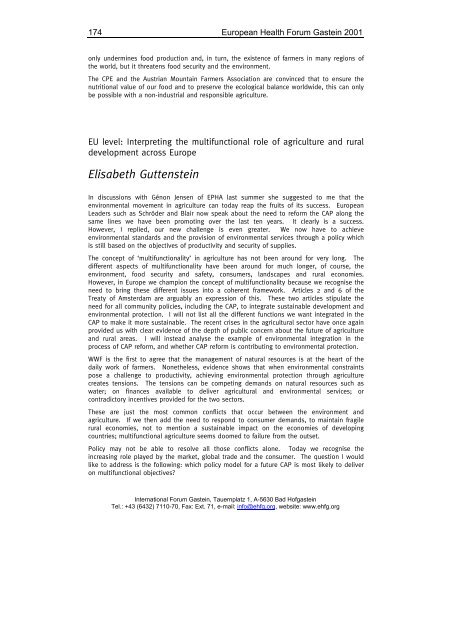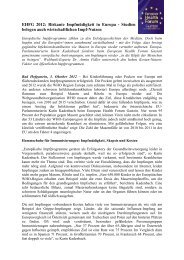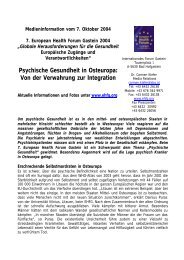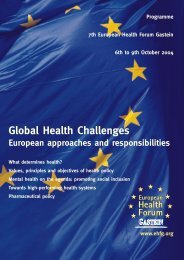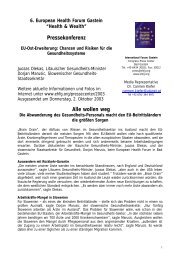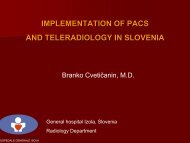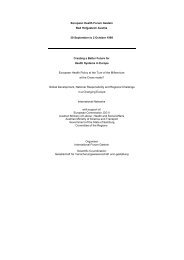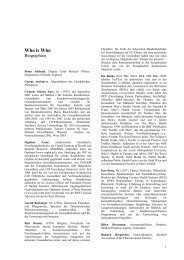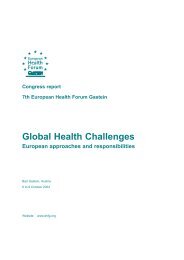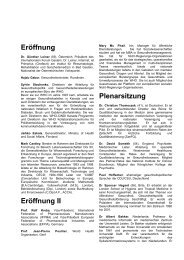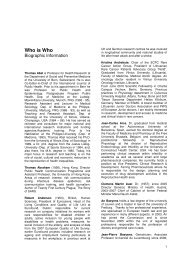Congress report - European Health Forum Gastein
Congress report - European Health Forum Gastein
Congress report - European Health Forum Gastein
Create successful ePaper yourself
Turn your PDF publications into a flip-book with our unique Google optimized e-Paper software.
174<br />
<strong>European</strong> <strong>Health</strong> <strong>Forum</strong> <strong>Gastein</strong> 2001<br />
only undermines food production and, in turn, the existence of farmers in many regions of<br />
the world, but it threatens food security and the environment.<br />
The CPE and the Austrian Mountain Farmers Association are convinced that to ensure the<br />
nutritional value of our food and to preserve the ecological balance worldwide, this can only<br />
be possible with a non-industrial and responsible agriculture.<br />
EU level: Interpreting the multifunctional role of agriculture and rural<br />
development across Europe<br />
Elisabeth Guttenstein<br />
In discussions with Génon Jensen of EPHA last summer she suggested to me that the<br />
environmental movement in agriculture can today reap the fruits of its success. <strong>European</strong><br />
Leaders such as Schröder and Blair now speak about the need to reform the CAP along the<br />
same lines we have been promoting over the last ten years. It clearly is a success.<br />
However, I replied, our new challenge is even greater. We now have to achieve<br />
environmental standards and the provision of environmental services through a policy which<br />
is still based on the objectives of productivity and security of supplies.<br />
The concept of ‘multifunctionality’ in agriculture has not been around for very long. The<br />
different aspects of multifunctionality have been around for much longer, of course, the<br />
environment, food security and safety, consumers, landscapes and rural economies.<br />
However, in Europe we champion the concept of multifunctionality because we recognise the<br />
need to bring these different issues into a coherent framework. Articles 2 and 6 of the<br />
Treaty of Amsterdam are arguably an expression of this. These two articles stipulate the<br />
need for all community policies, including the CAP, to integrate sustainable development and<br />
environmental protection. I will not list all the different functions we want integrated in the<br />
CAP to make it more sustainable. The recent crises in the agricultural sector have once again<br />
provided us with clear evidence of the depth of public concern about the future of agriculture<br />
and rural areas. I will instead analyse the example of environmental integration in the<br />
process of CAP reform, and whether CAP reform is contributing to environmental protection.<br />
WWF is the first to agree that the management of natural resources is at the heart of the<br />
daily work of farmers. Nonetheless, evidence shows that when environmental constraints<br />
pose a challenge to productivity, achieving environmental protection through agriculture<br />
creates tensions. The tensions can be competing demands on natural resources such as<br />
water; on finances available to deliver agricultural and environmental services; or<br />
contradictory incentives provided for the two sectors.<br />
These are just the most common conflicts that occur between the environment and<br />
agriculture. If we then add the need to respond to consumer demands, to maintain fragile<br />
rural economies, not to mention a sustainable impact on the economies of developing<br />
countries; multifunctional agriculture seems doomed to failure from the outset.<br />
Policy may not be able to resolve all those conflicts alone. Today we recognise the<br />
increasing role played by the market, global trade and the consumer. The question I would<br />
like to address is the following: which policy model for a future CAP is most likely to deliver<br />
on multifunctional objectives?<br />
International <strong>Forum</strong> <strong>Gastein</strong>, Tauernplatz 1, A-5630 Bad Hofgastein<br />
Tel.: +43 (6432) 7110-70, Fax: Ext. 71, e-mail: info@ehfg.org, website: www.ehfg.org


